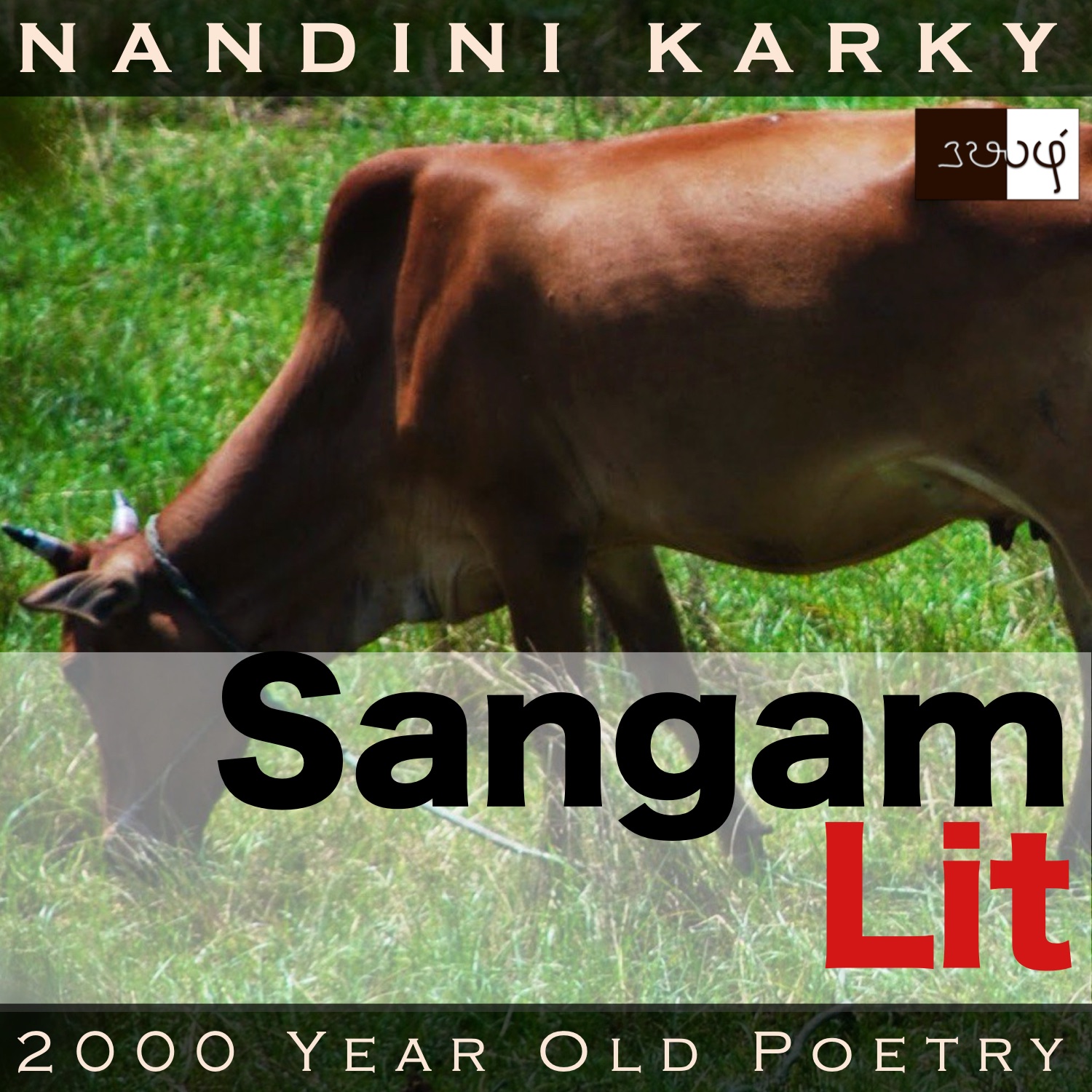Podcast: Play in new window | Download
Subscribe: Apple Podcasts | Spotify | Amazon Music | Android | iHeartRadio | TuneIn | RSS | More

In this episode, we observe scenes from an ancient agricultural region reflecting the inner landscape in marital relations, as depicted in Sangam Literary work, Natrinai 290, penned by Madurai Maruthan Ilanakanaar. Set in the agricultural regions of ‘Marutham’, the verse speaks in the voice of the confidante to the lady, passing on a pointed message to the singer, who has come to the lady’s house as a messenger from the man.
வயல் வெள் ஆம்பல் சூடு தரு புதுப் பூக்
கன்றுடைப் புனிற்றா தின்ற மிச்சில்
ஓய்நடை முது பகடு ஆரும் ஊரன்
தொடர்பு நீ வெஃகினை ஆயின், என் சொல்
கொள்ளல்மாதோ, முள் எயிற்றோயே!
நீயே பெரு நலத்தையே; அவனே,
”நெடு நீர்ப் பொய்கை நடு நாள் எய்தி,
தண் கமழ் புது மலர் ஊதும்
வண்டு” என மொழிப; ”மகன்” என்னாரே.
Opening with ‘வயல் வெள் ஆம்பல்’, the verse takes us to a fertile farmland, where amidst the green stalks of crops, ‘white lilies’ bloom too. The phrase ‘கன்றுடைப் புனிற்றா’ describes ‘a cow, which has recently given birth to a calf’ and ‘ஓய்நடை முது பகடு’ illustrates ‘an aged bull, slow in its walk’. Once again, we meet this curious descriptor for a woman’s teeth in ‘முள் எயிற்றோயே’ meaning ‘teeth like thorns’. Most of these Sangam similes are immediately accessible to us but this is one that remains puzzling, as to what the ancients might have meant by this expression. ‘பெரு நலத்தையே’ talks about the ‘great beauty of a lady’, one of the things considered as virtuous about women then. The phrase ‘தண் கமழ் புது மலர் ஊதும் வண்டு’ brings before us, ‘a buzzing bee that seeks out a moist, scented, new flower to suckle its honey’. The verse ends with ‘மகன் என்னாரே’ meaning ‘they do not consider him a good man’ and invites to listen to the story within!
The man and lady had been leading a married life when the man took to keeping the company of courtesans. The lady is angered by this action of the man and refuses to allow him entry to her house. The man sends a singer as his messenger to the lady’s house. The lady’s confidante, seeing the messenger, turns to the lady and says, “The fresh flower of the field’s white water lily cut along with stalks of crop is eaten by the cow, that has recently birthed a calf. What’s left of the cow’s grazing is then savoured by an old bull, with a slow gait. Such is the man’s land! If you desire a relationship with this man, please listen to what I have to say, O lady with thorn-like teeth! You are one of supreme beauty. Whereas, those who know him say that he’s a bee that roves by the long pond in the middle of the night to drink honey from cool, fragrant and fresh flowers many. Never will they concede that he’s a man of honour!” With these words, the confidante is conveying to the listening messenger that the lady is still angry at the man’s actions of seeking the company of other women.
Time to explore more! The confidante starts by talking about the man’s land, a land of fertile fields where flowers are cut along with the crops and piled up. A cow that has birthed a calf, full of hunger, feeds on these lilies and then, what’s left of that, is claimed by another old bull, slow to move. After this description of the man’s land, the confidante says that if the lady is thinking of reuniting with him, the lady must listen to what the confidante has to say. Then, she praises the extraordinary beauty of the lady and contrasts this with the man’s nature. The confidante explains what wise people talk about the man. Apparently, he is called a bee that roves in the night in search of fresh flowers, but never considered to be a man of virtue! With these condemning words, the confidante is telling the messenger about the anger in the lady’s heart at being slighted by the man. But, that’s not all!
In a hidden manner, the confidante is revealing to the lady, that just as it’s the nature of a bee to seek out new flowers, she seems to be saying it’s natural for the man to seek out the courtesans. Even in the scene unfolding in the field, the confidante is illustrating how society then accepted that the man’s grace will be relished not only by the lady but also by the courtesans, akin to the white lily being eaten by the mother cow and then, by an aged bull. On one side, the confidante seems to be mellowing the heart of the lady pointing to the inevitability of these occurrences in society then, but at the same time, she finishes by saying while it may be natural, it does not make it right and people with wisdom will not approve of this straying from the path of justice. Unlike a nomadic existence, where no one owned anything, in an agricultural land of plenty, resources tend to accumulate in the hands of a few, one such is the man depicted herein. A man of wealth is sought out by other elements of society, who may detract him from his path of commitment to his one love and he may naturally gravitate towards them as well. It’s this clash between what’s inevitable or natural and what’s honourable or right that finds its echo in this song from long ago!




Share your thoughts...